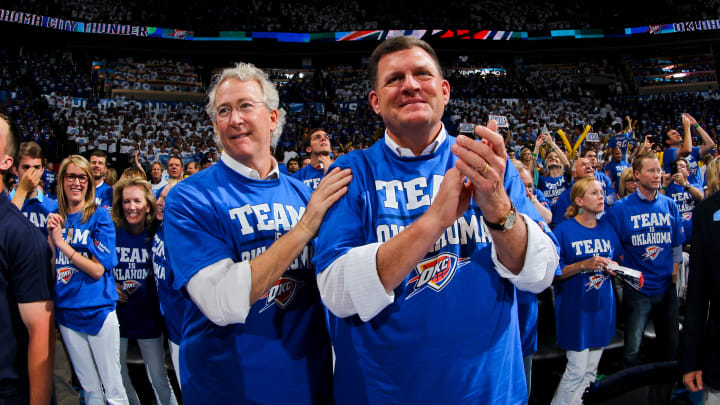Autopsy: Oklahoma energy magnate's death accidental

OKLAHOMA CITY (AP) The fiery one-car crash in which energy industry magnate Aubrey McClendon died was an accident, with no alcohol in his system and only traces of a drug commonly used in sleep aids, the Oklahoma medical examiner's office ruled Wednesday.
Authorities have said there wasn't enough evidence to prove whether the March 2 crash, in which McClendon's SUV smashed head-on into a bridge wall at nearly 80 mph, was intentional. But it happened the day after the former Chesapeake Energy CEO and part-owner of the Oklahoma City Thunder was indicted by a federal grand jury, leading to speculation of a possible suicide.
Whether McClendon's death was ruled a suicide or an accident will have little bearing on McClendon's estate, and here's why, as well as what's still unresolved:
---
LIFE INSURANCE
All life insurance policies in the state have a two-year incontestability clause, which means if the policy was at least 24 months old, it would be paid out even if the death had been ruled a suicide, according to Gordon Amini, general counsel of the Oklahoma Insurance Department.
He said an insurance company would have to prove a fraudulent intent if it wanted to deny a claim on a policy less than 24 months old.
''If you imagine yourself inside the insurance company offices and they're discussing any kind of issue like this, they're going to want to say, `Do we think it is suicide?' If they're absolutely certain it was, the second thing they're going to ask is if they can prove it,'' Amini said, noting that would be a ''tough sell.''
It wasn't known whether McClendon had insurance policies in force either longer or less than 2 years.
---
PROBATE CASE
McClendon's estate, which includes an ownership interest in the Thunder and extensive real estate holdings, already is in court in Oklahoma County.
McClendon left all of his property to a revocable trust in his will, which was drafted in 2015. His wife, Kathleen McClendon, was listed as the executor, but she has since appointed attorney Tom Blalock to that role. The couple had three adult children, each of whom is also listed as an heir.
Creditors, including firms that have done business with McClendon and his companies, have requested an inventory and appraisement of the estate.
The medical examiner's determination that the death was an accident makes no difference in settling McClendon's estate, said Brent Coldiron, an Oklahoma City attorney who specializes in probate, wills and living trusts.
''As far as the general probate itself, when you're dead you're dead,'' he said.
---
STAKE IN TEAM
McClendon's roughly 20 percent ownership stake in the Oklahoma City Thunder has become a concern of his estate's creditors.
Kathleen McClendon wants to buy the stake worth an estimated $190 million, according to transcripts of a May 13 probate hearing obtained by The Oklahoman newspaper, but an attorney for one of the estate's creditors raised concerns that the shares could be sold to a family member for less than what it would receive on the open market.
But estate attorney Martin Stringer said at that hearing that the Thunder interest is not for sale.
---
McCLENDON'S COMPANIES
While McClendon owned a business interest in dozens of companies, he was best known for co-founding Chesapeake Energy and serving as its CEO before stepping down in 2013 amid philosophical differences with a new board of directors.
Afterward, he founded American Energy Partners, another Oklahoma City oil and natural gas company. That company has since closed.
---
CRIMINAL ALLEGATIONS
On March 1, a federal grand jury indicted McClendon for allegedly conspiring to rid the bidding process for natural gas leases in Oklahoma from 2007 to 2012.
In the charging document, prosecutors alleged McClendon, two unnamed companies and an unnamed co-conspirator would decide who would win the bid to certain drilling rights and give the ''loser'' a share in the lease.
McClendon had vowed to fight the allegations; federal prosecutors dropped the indictment after he died.
---
INVESTIGATION'S FINDINGS
Police have said McClendon was driving 78 mph when his SUV burst into flames after hitting a concrete support that abuts the two-lane road. There was no evidence suggesting he tried to avoid the crash.
The vehicle's data recorder showed McClendon was driving 88 mph and then tapped his brakes before impact, police have said. McClendon also had his gas pedal floored until 1 1/2 seconds before impact, when he reduced it from 99 to 25 percent depressed, they said. Investigators found tire tracks but no skid marks.
''We spoke to anybody who may have had contact with him after he found out about the indictment,'' Oklahoma City Police Capt. Paco Balderrama said Tuesday. ''He did not leave anything that would be interpreted as a suicide note or message.''
Another driver has since died in the same spot in a similar collision.
---
Follow Sean Murphy at www.twitter.com/apseanmurphy
